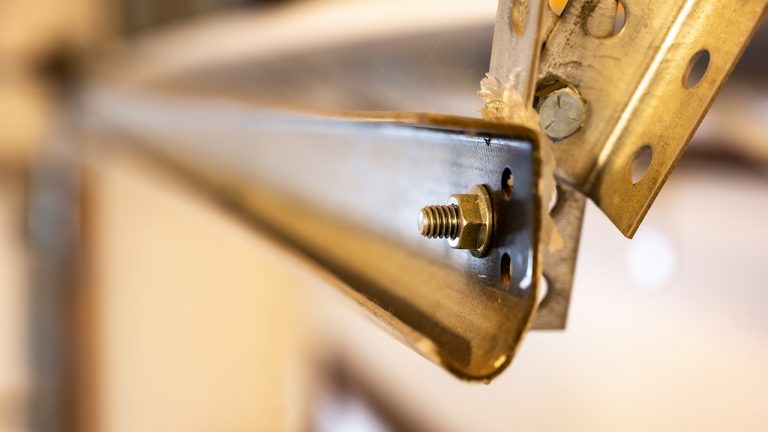Garage Door Track Adjustment: Your Ultimate Guide to Smooth Operation
Hey there, fellow garage door enthusiasts! Let’s talk about something we’ve all faced at least once: that heart-sinking moment when your garage door starts grinding, squealing, or just plain refusing to cooperate. Maybe it’s wobbling like a tipsy weekend warrior or sounding like a horror movie soundtrack every time it moves. Sound familiar? Don’t worry—we’ve got your back. Today, we’re breaking down everything you need to know about garage door track adjustment. And hey, if DIY isn’t your jam (no judgment here), we’ll tell you why our Etobicoke-based crew at Fixadoor Garage Doors is the team to call. Let’s roll!
Why Garage Door Tracks Deserve Your Attention
Let’s start with the basics: tracks are the unsung heroes of your garage door system. They’re the metal “highways” that guide your door up and down smoothly. When they’re aligned properly, life is good. But when they’re even slightly off? Chaos ensues. Misaligned tracks can lead to:
- Noisy garage door symphonies (and not the kind anyone wants to hear)
- Uneven movement or doors that get “stuck” mid-operation
- Premature wear on rollers, hinges, or even your automatic garage door opener
Think of it like driving a car with misaligned wheels—you could do it, but why risk the long-term damage?
Signs Your Tracks Need a Little TLC
How do you know if your tracks are throwing a tantrum? Here’s what to watch for:
- Grinding or screeching noises: If it sounds like a metal band rehearsing in your garage, your tracks are likely the culprits.
- Visible gaps between the rollers and the track.
- Door “jumping” or shaking during operation.
- Bent or dented tracks (this one’s a red flag—don’t ignore it!).
Pro tip: If you’re in Mississauga or Etobicoke and spot these issues, give Fixadoor Garage Doors a shout. We’ll handle the dirty work so you can get back to binge-watching your favorite shows.
DIY Track Adjustment: A Step-by-Step Playbook
Feeling brave? Here’s how to tackle minor track adjustments yourself. Just remember: safety first!
Tools You’ll Need:
- Rubber mallet
- Level
- Wrenches and screwdrivers
- Patience (trust us, you’ll need it).
The Process:
- Disconnect the opener: Safety isn’t a suggestion—it’s a requirement.
- Loosen the track bolts: Use your wrench to gently nudge the track back into alignment.
- Check for level: That trusty level will tell you if things are straight.
- Tighten everything up: Once aligned, secure those bolts like your sanity depends on it.
But here’s the kicker: if you’re dealing with broken springs, garage door cable repair, or severe track bends, put down the tools. Seriously. These jobs are best left to pros (like us at Fixadoor) unless you’re craving a DIY horror story.
When to Call in the Cavalry
Look, we get it—DIY projects can be satisfying. But there’s a fine line between “handy homeowner” and “disaster in sweatpants.” Here’s when to pick up the phone:
- Commercial garage door repair: Heavy-duty doors require heavy-duty expertise.
- Automatic garage door opener installation: Wiring + heavy machinery = nope for newbies.
- Persistent noise or movement issues: If your fixes last about as long as a snowman in July, it’s time for backup.
FYI, Fixadoor Garage Doors serves Etobicoke, Mississauga, and beyond. Whether it’s a noisy garage door, broken spring, or full garage door installation, we’ve got the skills (and the coffee) to get it done right.
Common Track Adjustment Mistakes (Don’t Be This Person)
We’ve seen it all. Avoid these face-palm moments:
- Overtightening bolts: This can warp the tracks. Easy does it!
- Ignoring roller condition: Worn rollers = uneven pressure on tracks. Replace them!
- Skipping lubrication: A dry track is a noisy track. Use silicone-based spray, not WD-40.
DIY vs. Pro Repair: The Cold Hard Facts
Let’s break it down with a handy table:
| Factor | DIY | Professional Repair |
|---|---|---|
| Cost | $20–$50 (tools + parts) | $150–$400 (depending on issue) |
| Time | 2–4 hours (if you’re lucky) | 1–2 hours (while you nap) |
| Safety Risk | High (hello, heavy doors!) | Zero (we’ve got insurance for a reason) |
| Tools Required | You supply the sweat | We bring the heavy artillery |
IMO, unless you’re a seasoned pro, the price of professional repair is worth every penny for the peace of mind.
FAQs: Your Burning Questions, Answered
1. How often should I adjust my tracks?
Most doors need a tune-up every 1–2 years. If you’re in a climate like Mississauga’s (hello, freeze-thaw cycles!), aim for annual checks.
2. Can misaligned tracks cause a noisy garage door?
Absolutely! Misalignment stresses rollers and hinges, leading to squeaks, grinds, and your neighbor’s side-eye.
3. What’s the average cost for professional track repair?
Typically $150–$400, depending on damage. Fixadoor offers free estimates—no sketchy hidden fees.
4. Do commercial garage doors need more frequent adjustments?
Yep. Heavy use = more wear. Schedule bi-annual inspections if your business relies on smooth door operation.
Final Thoughts: Keep Calm and Call Fixadoor
At the end of the day, garage door track adjustment is equal parts science and art. While minor tweaks are DIY-friendly, major issues demand a pro’s touch. Whether you’re in Etobicoke, Mississauga, or somewhere “near me,” Fixadoor Garage Doors is here to save your weekends (and your sanity).
Why wrestle with wrenches when you could be sipping a cold drink instead? Give us a ring, and let’s get that door humming like it’s brand new. Cheers to smooth operations—and fewer DIY regrets! 😀


